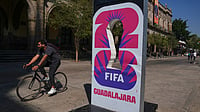Before the Paris Olympics open and upend the French capital's usual rhythms, retiree Pierre Schapira plans to hire a car and quit town. (More Sports News)
But, with the intense Olympic security measures and traffic disruptions they'll cause, will that even be doable? For his answer, Schapira went straight to the top — popping the question this week to the chief of police Laurent Nunez himself.
As he's already done at other town hall meetings, did so again at this one, and will do at more to come, Nunez ever-so-patiently explained that Parisians are going to have to adapt to the July 26-August 11 extravaganza, but that it's not going to put their lives and livelihoods on hold.
“It's not going to stop you from entering or leaving Paris,” Nunez said Thursday to the audience of about 200 people, including some watching via video link in an overflow room next door.
Holding the Games in the bustling heart of such a compact city, rather than in a purpose-built Olympic park in the outskirts like Rio de Janeiro in 2016 and other previous hosts, was always going to rile and worry some Parisians who can be cantankerous at the best of times. Nunez, Games organizers and City Hall officials are finding that out for themselves as they embark on a concerted campaign to win Parisian hearts and minds and get people in the Olympic mood or, at least, get ready.
“We laugh about it ... because we are spending nearly all of our evenings together,” Deputy Paris Mayor Pierre Rabadan said after he, Nunez and other organizers spent more than two hours at the meeting detailing Games preparations and responding to questions.
“It's quite time-consuming but necessary," Rabadan said. One of their aims, he added, is “to go against the talk at the moment that it's better to leave, that being in Paris is going to be a catastrophe and whatnot. You get that at every Games, and obviously, we knew that because of our concept, we'd hear that, too.”
By mostly using existing sports venues as well as temporary ones that will be erected in the shadow of the Eiffel Tower and at other iconic sites before being dismantled again, Paris' goal is to avoid the legacy of waste and vast costs generated by other Games and reduce the mega event's environmental impact. Images of Olympians competing amid the architectural beauty of central Paris should, organizers and the government hope, make France shine.
But, for the 2.1 million people who live within the city limits and hundreds of thousands of others who commute in from the suburbs, the consequences of 10,500 athletes competing in their midst are going to be considerable. Traffic restrictions, special permits for this and that, police checkpoints, road and Metro station closures, and millions of visitors from elsewhere in France and around the world. The list goes on.
“It's a fantastic gamble but it's going to be quite disruptive for residents,” said 79-year-old Schapira after hearing Nunez and the other speakers.
Jean-Pierre Rollin, who owns two souvenir stores near Notre Dame Cathedral on its island in the River Seine, wanted to know whether tourists can get past police checkpoints before and during the July 26 opening ceremony. It is being held on the river and a security cordon will be in place along both banks.
“If we have no customers, there's no point staying open,” Rollin told Nunez. The police chief acknowledged the security that day is going to make getting around more complicated.
Other questions also focused on the impacts of security measures. One man asked whether there'll still be fireworks for France's July 14 national holiday and was told there will.
Only once, when a retailer said he'd heard that daytime deliveries would be banned, did the police chief lose patience, puffing out his cheeks.
Not true, he insisted.
“I can't repeat things 50,000 times,” he said. “I don't want to hear things like that.”
The work of preparing people has a way to go. A government website, “Plan for the Games,” offers tips. Among them: avoid Olympic crowds on public transport by riding bikes or walking.
Schapira, the retired dentist and former politician, came out of the meeting thinking, "it is indeed extraordinary to have the Games inside Paris."
But, he was nevertheless grateful that he'd be in the Alps by then, on holiday.
“I prefer to watch them on the television,” he said. “I'm not enough of a sports fan to stay. I am happy to be leaving.” (AP) AYG






















